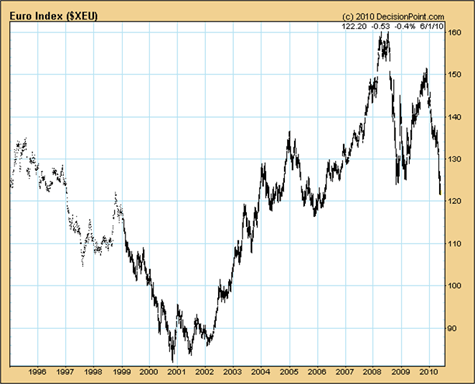
The Euro Is Washed Up — But the Dollar Is No Better
Greece has made it obvious: The euro is doomed. This fact had been obvious to all the euro critics from the very beginning. All the arguments against the possibility of a common currency for very disparate countries had been raised, but brushed away by overzealous politicians.
They’ll learn their monetary lesson the hard way in the coming years.
Unfortunately the current discussion about Greece, Spain and all the other PIIGS countries is very superficial … Greece is everywhere!
In fact, the whole western world and Japan are over indebted …
You’ve likely read in the press about debt to GDP figures like 200 percent for Japan, 115 percent for Italy, 113 percent for Greece, 85 percent for the U.S., 76 percent for France, 73 percent for Germany, or 70 percent for the UK.
These are dangerous levels, although not outrageous ones. But government officials don’t tell the whole story; they sugarcoat the real dimension of the over indebtedness.
That’s why you need to understand …
Explicit Versus Implicit Debt Levels
Explicit debt leaves out important obligations like pensions and social security. If you add these in, you get what economists call the implicit government debt.
And if you use the implicit government debt to GDP ratio, the picture is much bleaker. Look for yourself:
Germany: 255 percent
France: 255 percent
UK: 530 percent
U.S.: 570 percent
This is frightening, indeed. These obligations are unbearable. Which means governments all over the world will have to break many of the promises their predecessors have made to get elected.
There are ways to get out of too much debt. The first is by …
Default
When you default, you sit down with your creditors, and restructure the debt. Creditors have to take the losses, and rightly so. They consciously took on this risk to earn a profit. Yes, they made bad decisions. But that’s the way capital markets function.
And tinkering with this process leads to bad capital allocation, an inefficient economy and less growth.
Another way out is to …
Crank Up the Printing Press!
Most modern governments have a trump card many ancient governments would have died for. They reign over fiat currencies, which can be created by the stroke of a computer key. As Ben Bernanke once said so famously:
“But the U.S. government has a technology, called a printing press (or, today, its electronic equivalent), that allows it to produce as many U.S. dollars as it wishes at essentially no cost.”
Therefore, modern governments with a printing press can bail themselves out of all debt problems. And I believe they can and probably will inflate their way out of today’s debt problem. They’ll pay back their debts nominally, with money that’s worth less. But they will not have to default.
Unfortunately, at the end of this road, the bond market and the currency will be destroyed. I don’t know how far our politicians will go in the coming years. Although I fear they will go this bitter way to its very end.
They Will Inflate in Lockstep
What I am nearly sure of is that the U.S. with its Fed and the EU with its ECB will inflate more or less in lockstep — like they have in the past.
Now euro bashing is all the rage. A short six months ago dollar bashing was en vogue. Have a look at a long-term dollar/euro chart below.

If you take this perspective, it really looks like not much has happened during the last few months. Yes, the euro is down to levels seen in 2004-2006 or 1995-1997 (when the euro was not yet an official currency). But at the same time the euro is much higher than it was in 1999-2003. So it has a long way to fall.
Sure, the euro is doomed. But so is the dollar! Both fiat currencies have lost massively against gold in the last few years. And as long as the bad fiscal and monetary policies prevail, gold will keep rising.
Best wishes,
Claus
This investment news is brought to you by Money and Markets. Money and Markets is a free daily investment newsletter from Martin D. Weiss and Weiss Research analysts offering the latest investing news and financial insights for the stock market, including tips and advice on investing in gold, energy and oil. Dr. Weiss is a leader in the fields of investing, interest rates, financial safety and economic forecasting. To view archives or subscribe, visit http://www.moneyandmarkets.com.
